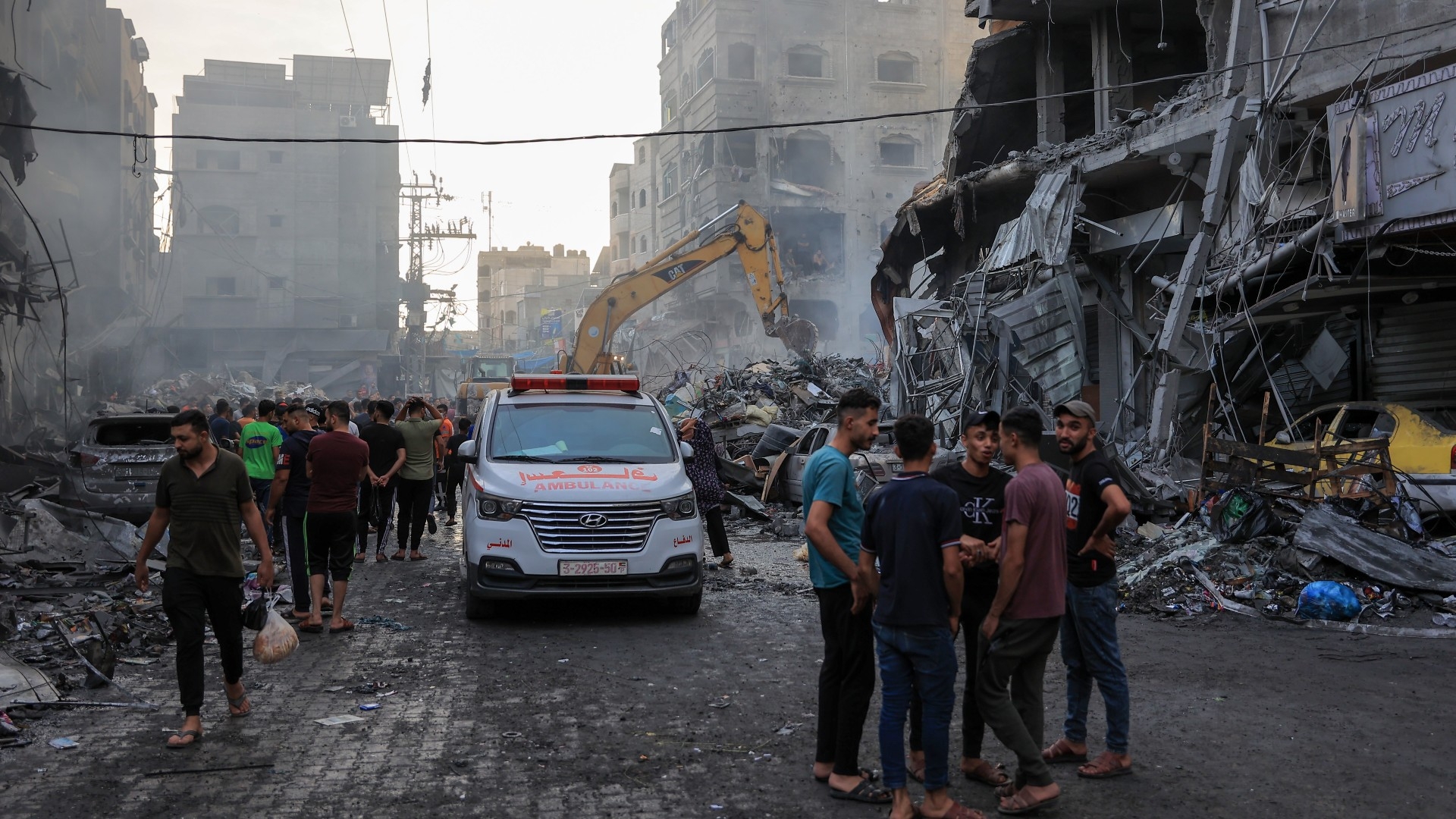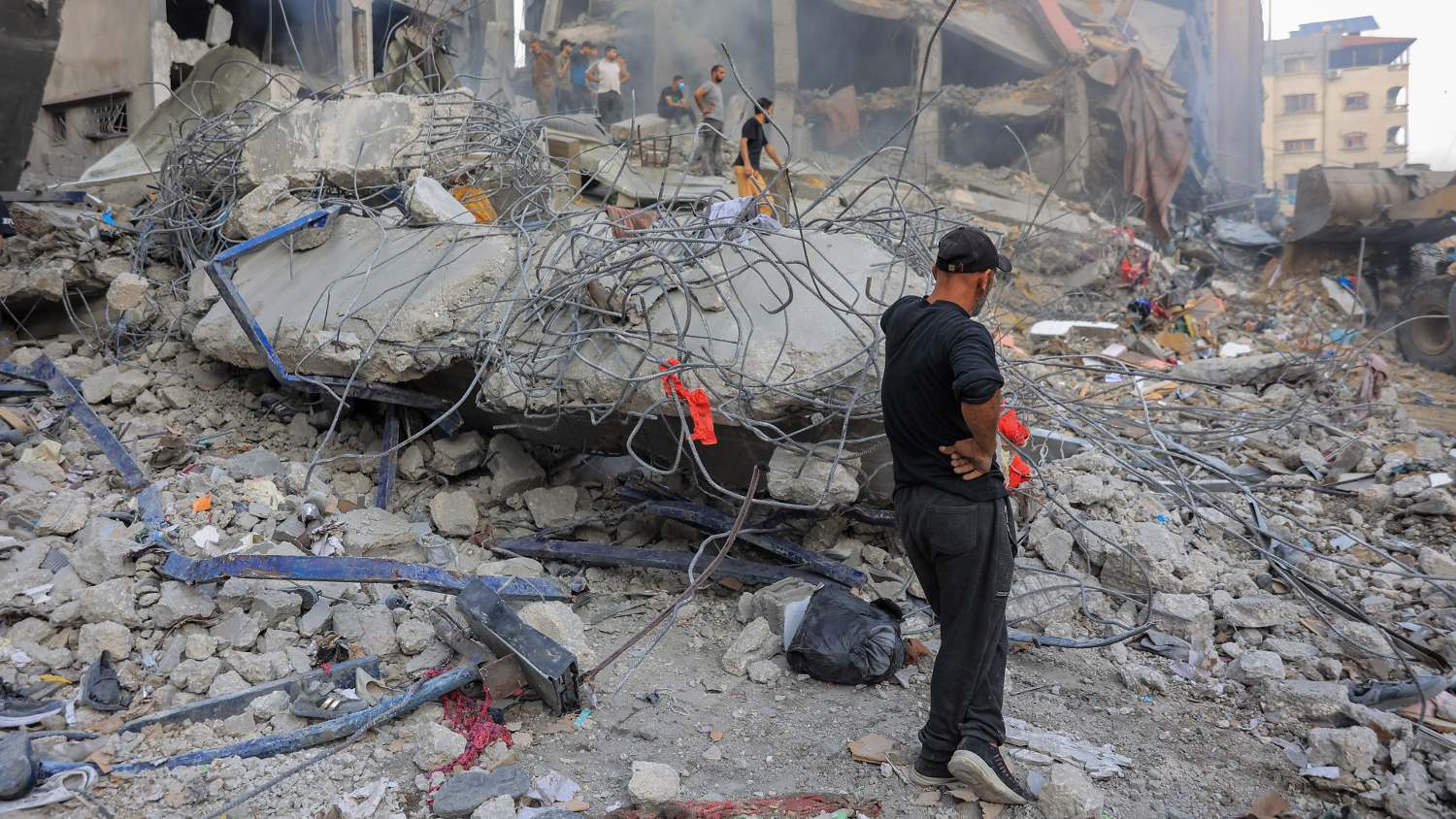Israel-Palestine war: They were told to leave their homes. They did. They were still bombed

Palestinians in Beit Hanoun woke up on Sunday to clear instructions from the Israeli army: leave your homes and head to the city centre.
The warning, which usually precedes most Israeli air strikes, wasn't much of a surprise, given that Israeli bombs had rained down on the besieged Gaza Strip for a third successive day.
Many in Beit Hanoun, a densely packed area in northeast Gaza, heeded the call. They went westwards, some two kilometres away, to the Jabalia refugee camp, in the hope of finding relative safety.
But instead, they were greeted with death.
Israeli fighter jets bombed two buildings in the main market of the camp, killing at least 50 people, Gaza's Ministry of Health has said.
Stay informed with MEE's newsletters
Sign up to get the latest alerts, insights and analysis, starting with Turkey Unpacked
"I was driving my car and about to enter the street, suddenly the sky flashed with [immense] light," Muhammed Lubbad, a Gaza resident, told Middle East Eye, moments after strikes.
"[Suddenly] people were on top of [my car], people were literally thrown into the air. Some [bodies] were found on the rooftops of buildings. Children's [bodies] were on the streets, someone's head was cut from his body, his head was thrown outside and body inside the building," he added.
Struggling to compose himself, Lubbad's car bore the signs of the devastating raid, with the blood of passersby smeared across it.
"I am still not fully aware of what happened," he said. "Dozens of people were killed, including taxi drivers, pedestrians, and sellers. Almost everyone who was inside the Rabaa Mall was killed. No one there was left alive.
"It's a massacre that no one imagined could happen."
Israel launched air strikes on Gaza on Saturday after fighters from the territory launched an unprecedented attack on the security barrier that controls Palestinian movement in and out of Israel.
After firing thousands of rockets and sending hundreds of fighters across the boundary by land, air and sea, the Palestinian fighters killed at least 800 Israelis and took more than 100 hostages.
In the last 24 hours, Israel's air force has dropped at least 2,000 munitions and more than 1,000 tonnes of explosives on the strip.
High-rise residential buildings, businesses, mosques, hospitals and banks have all been targeted. At least 560 Palestinians have been confirmed dead and more than 2,900 wounded. Many in Gaza told MEE that they had resigned themselves to further fatalities.
'From one targeted place to another'
Muhammed Abdallah, a resident of the Jabalia refugee camp, was at home when the attack took place.
"The air strikes shook the house, my grandchildren were thrown [against the walls] and the shattered glass windows hit them. We carried them and went down to the streets looking for an ambulance or any assistance, only to find out that the entire area was strewn with bodies [of those killed]," Abdullah told MEE.
"Bodies were in piles, malls on fire, homes knocked down, cars destroyed. More than 50 bodies were on the street. We did not know what to do.
"Those of us who could carry any [victims] while fleeing the area, did."
'Bodies were in piles, malls on fire, homes knocked down, cars destroyed'
-Muhammed Abdallah, resident
Abdullah said that the majority of those killed were displaced from nearby areas after receiving text messages from Israeli forces, urging them to head to the city centre.
"We took taxis to the hospital to treat those [of our children] who were wounded and evacuated the rest to the Rimal neighbourhood. And now we just received messages urging us to evacuate the Rimal area. We took them from a targeted place to another that will be targeted,” he said.
"Now we don't know where to take them."
Densely populated
The areas that were targeted were close to a school run by the UN agency that cares for Palestinian refugees (UNRWA). Over 20,000 Palestinians have sought refuge have sought refuge in 44 UNRWA-run schools.
More than 60 percent of Palestinians in Gaza are refugees, following the expulsion of families from other parts of Palestine in 1948.
Flanked by Israel and Egypt on the Mediterranean coast, the Gaza Strip is one of the most densely populated areas in the world.
Roughly 97 percent of Gaza's drinking water is contaminated, and residents are forced to live with constant power outages due to a power grid that has been heavily damaged in repeated Israeli attacks.
Meanwhile, close to 60 percent of Palestinians live in poverty, and youth unemployment sits at 63 percent.
According to UNRWA, years of conflict and blockade have left 80 percent of Gaza's population dependent on international assistance.
This article is available in French on Middle East Eye French edition.
Middle East Eye delivers independent and unrivalled coverage and analysis of the Middle East, North Africa and beyond. To learn more about republishing this content and the associated fees, please fill out this form. More about MEE can be found here.





.jpg.webp?itok=5dbwLUSa)